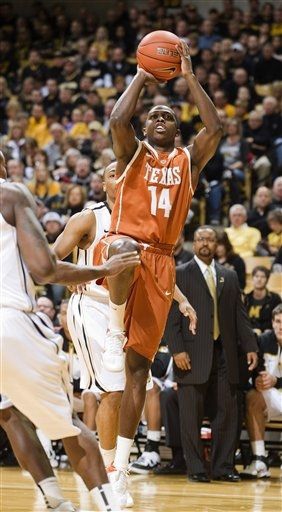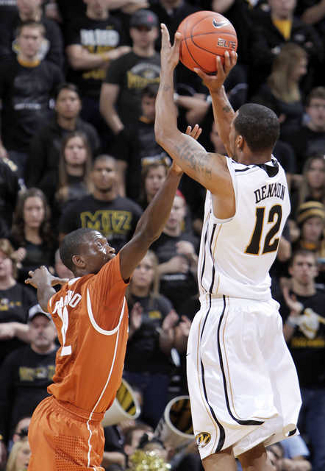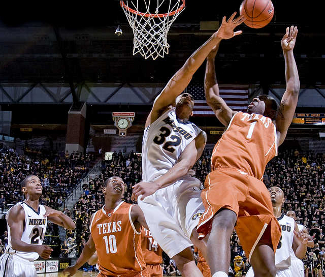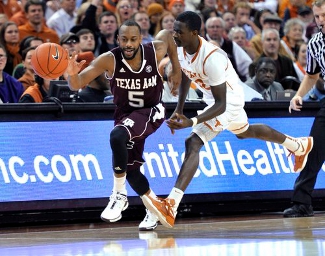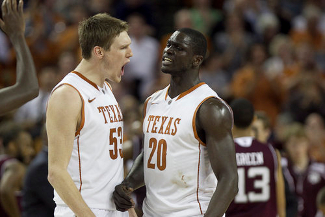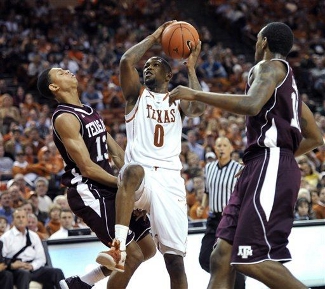Texas Longhorns (12-4 overall, 2-1 Big 12) at #9/9 Missouri Tigers (15-1, 2-1)
Mizzou Arena | Columbia, MO | Tip: 12 P.M. CT | TV: ESPN2
LRT Consecutive Game #203
The Longhorns embark on the toughest portion of their schedule this afternoon, taking on a top-ten Mizzou squad that was still undefeated at this time last week. In the ensuing five games, Texas will also face Baylor and Kansas State on the road, while hosting Kansas, Iowa State, and this same Missouri team. Every single game is going to be tough to win, which is terrible news in a season where the Horns need every conference win they can get to simply make the NCAA tournament.
The one positive in all of this is that of the three tough road games, this is the one Texas has the best chance in. Against this murderer’s row, that’s not saying a whole lot, but it should be some comfort to Longhorn fans that amongst the league’s elite teams, these Tigers are the best match-up for Texas. The Horns are weakest in the frontcourt, which just so happens to be where the Tigers are thin, as well.
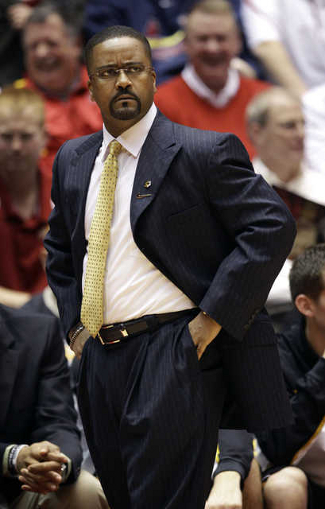
Frank Haith has hit the ground running in Columbia
(Photo credit: Charlie Neibergall/Associated Press)
By the numbers
Although Mizzou’s frontcourt leaves a lot to be desired, they still have the best two-point field-goal percentage in the country, knocking down 57.6% of their shots from inside the arc. That’s a result of constantly attacking the paint, whether on the dribble or with smart, hard cuts that lead to easy layups. All told, Mizzou’s offensive efficiency is second in the nation, with the Tigers putting in 1.211 points per possession.
Behind the arc, Missouri is just as dangerous. The Tigers have made nearly 40% of their long-range attempts, led by seniors Kim English (No. 24) and Marcus Denmon (No. 12), who are shooting 53% and 48.7% behind the arc, respectively. The Tigers are also loaded with quick guards in the backcourt, so opposing teams have to decide whether they’d rather give up the blow-by when they are pressuring the perimeter or give up a wide-open three when sagging to cut off penetration. As the numbers show, there’s simply no good choice.
With former coach Mike Anderson now in Fayetteville, the Tigers no longer employ relentless full-court pressure, but they still play nasty defense. Under former Texas assistant Frank Haith, this year’s Missouri team just waits to turn up the pressure until after opponents have crossed half-court. Their talented crop of guards can all defend well on the perimeter, and they still force turnovers on more than 23% of possessions despite abandoning the “Fastest 40 Minutes of Basketball” approach. The high-octane offense and tenacious D still add up to a quick tempo, however, but the Tigers “only” average 69 possessions per game, currently the 82nd-fastest pace in Division I.
It’s also worth noting that the Tigers play good D without fouling. Their defensive free-throw rate is 15th-best in D-I at the moment, as opponents shoot just a little more than one free throw for every four field goal attempts. That discipline on the defensive end is huge, as Missouri is now down to just a seven-man rotation and cannot afford to have any players in foul trouble.
Meet the Tigers
That seven-man Missouri rotation was supposed to be nine deep, but a devastating injury and ill-timed transfer have dramatically changed the make-up of the Tiger roster. Senior forward Laurence Bowers tore his ACL on October 3rd, just a little more than a month before the Tigers tipped off the season, leaving Mizzou with only three legitimate options in the frontcourt. Then, just before conference play began, Toronto product Kadeem Green announced his intentions to transfer somewhere closer to home.
The Bowers injury and Green transfer left Ricardo Ratliffe (No. 10) as the sole big man in the starting five. At just 6’8″, Ratliffe is severely undersized as the primary post option against most Big 12 teams, but he knows how to establish good post position before the entry pass and makes quick, confident moves once he gets the ball. He’s smooth on his spin move and is solid with the jump hook, so even though Clint Chapman and Alexis Wangmene have a few inches on Ratliffe, they’ll have to push him off the block and deny those deep entry passes.
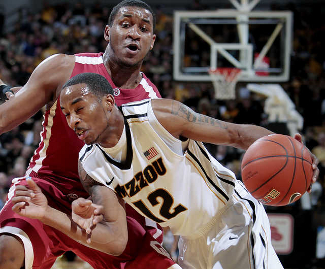
Defenses can’t even stop Denmon when his eyes are closed
(Photo credit: Rich Sugg/The Kansas City Star)
The Tigers have only one other big man in Steve Moore (No. 32), who comes off the bench to average just under 17 minutes per game. Moore is nowhere near the offensive threat of Ratliffe, but is a stout 6’9″ guy that provides some rebounding help and defensive presence in the paint.
With the lack of frontcourt options, the Tigers have had to rely on their strength in the backcourt. Coach Haith has elected to go with a four-guard look, and so far it has worked to near-perfection. Senior Marcus Denmon (No. 12) is the Big 12’s leading retuning scorer, and he’s near the top of the charts again this season with his 17.9 points per game. He’s incredibly quick with the basketball and can slice right through the defense to get to the rack. As mentioned earlier, he’s also a very dangerous three-point shooter, so it’s difficult to keep Denmon in check for very long.
The man facilitating the offense is sophomore guard Phil (Flip) Pressey (No. 1), who has made an amazing leap from his freshman year. The younger of two Presseys on the team, Phil struggled with turnovers during his first collegiate season, but has turned into a highly efficient point guard this year. He’s currently posting a 2.7 assist-to-turnover ratio, but is averaging 5.5 assists per game over his last ten.
Perhaps the area of greatest improvement for Flip this season is his new-found ability to adjust his speed as he reads the defense. Instead of flying recklessly into a waiting defense, he now hesitates, watches the play develop, and finds the cracks or passing lanes. If a team is slow getting back, he finds another gear and will take it coast to coast. Although this current Missouri roster is loaded with seniors, the future is still bright with Pressey running the point for two more years.
Phil’s older brother, Matt Pressey (No. 3) is possibly the best perimeter defender on the team, which is really saying something with this group of guards. He’s also no slouch on the offensive end, chipping in nearly nine points a game while making a third of his attempts from behind the arc.
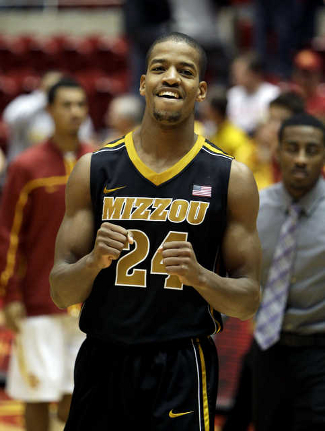
Senior Kim English has a lot to smile about this season
(Photo credit: Charlie Neibergall/Associated Press)
Senior Kim English (No. 24) rounds out the starting five, where he’s playing what amounts to the power forward role despite having the body of a small forward. As previously mentioned, he’s been practically unconscious from outside so far this season, drilling 53% of his threes. English is also able to put the ball on the floor and slash from the wings to create looks for himself. His prowess from behind the arc plus his ability to generate good looks have the senior ranked second in the nation with an insane 68.7% effective field goal percentage.
Off the bench, Missouri’s sixth man is junior Michael Dixon (No. 11), who is another excellent perimeter defender for the Tigers. Despite seeing just 26 minutes per game off the bench, he’s still second on the team with 27 steals and he converts those turnovers into fast-break points. Once the starting point guard, Dixon has adjusted well to his new role as sixth man, which is a big reason for Missouri’s success so far. The best teams have guys who understand their roles, and the maturity with which Dixon has handled himself after losing the starting job to Pressey is a boost to the team’s performance and chemistry.
Keys to the game
1) Play sound team defense – The Tigers make great cuts without the basketball and have a roster filled with excellent ballhandlers who can attack the paint off the dribble. Texas will constantly be challenged on the defensive end, and will undoubtedly be plays where someone loses their man or gives up penetration. The key is for the Horns to play well as a defensive unit and be aware enough to provide timely help. Missouri can move the ball very well, but forcing them to work the ball around even more on busted assignments will keep things from getting out of hand.
2) Weather the storm – Missouri can score in bunches, and a full Mizzou Arena is an absolute powderkeg. With the planned “blackout” for today’s game, you can tell that fans are still treating this as a big game despite it being a down year for Texas. When the Tigers get on one of their inevitable runs, the roof is likely to blow right off the building. These young Longhorns have yet to produce a win under hostile conditions — sorry, an 80% empty L.A. Sports Arena doesn’t count — so they must show poise when things get tough this afternoon.
3) Clean the glass – Missouri doesn’t miss often, but the Longhorns can’t afford to give them extra chances when they do. Fortunately, this is one of the rare times this season that Texas has the edge in the frontcourt. The Longhorns must take advantage of this and close out good defensive possessions by securing the boards, something they had difficulty doing against A&M even when the ball was right in their hands. On the other end of the court, if Clint Chapman, Jonathan Holmes, or Jaylen Bond can get some putbacks, it will only make things easier against a tough Tiger D.
4) Avoid foul trouble – Not only is this important because the Longhorn roster lacks depth, but avoiding fouls also keeps the Tigers off the free-throw line, where they are practically automatic. Dixon has made 91% of his attempts, while Denmon is just a shade under 93% from the charity stripe. As a team, the Tigers are one of the 10 best in the country when it comes to converting the freebies, sinking almost 77% at the line.
| 







